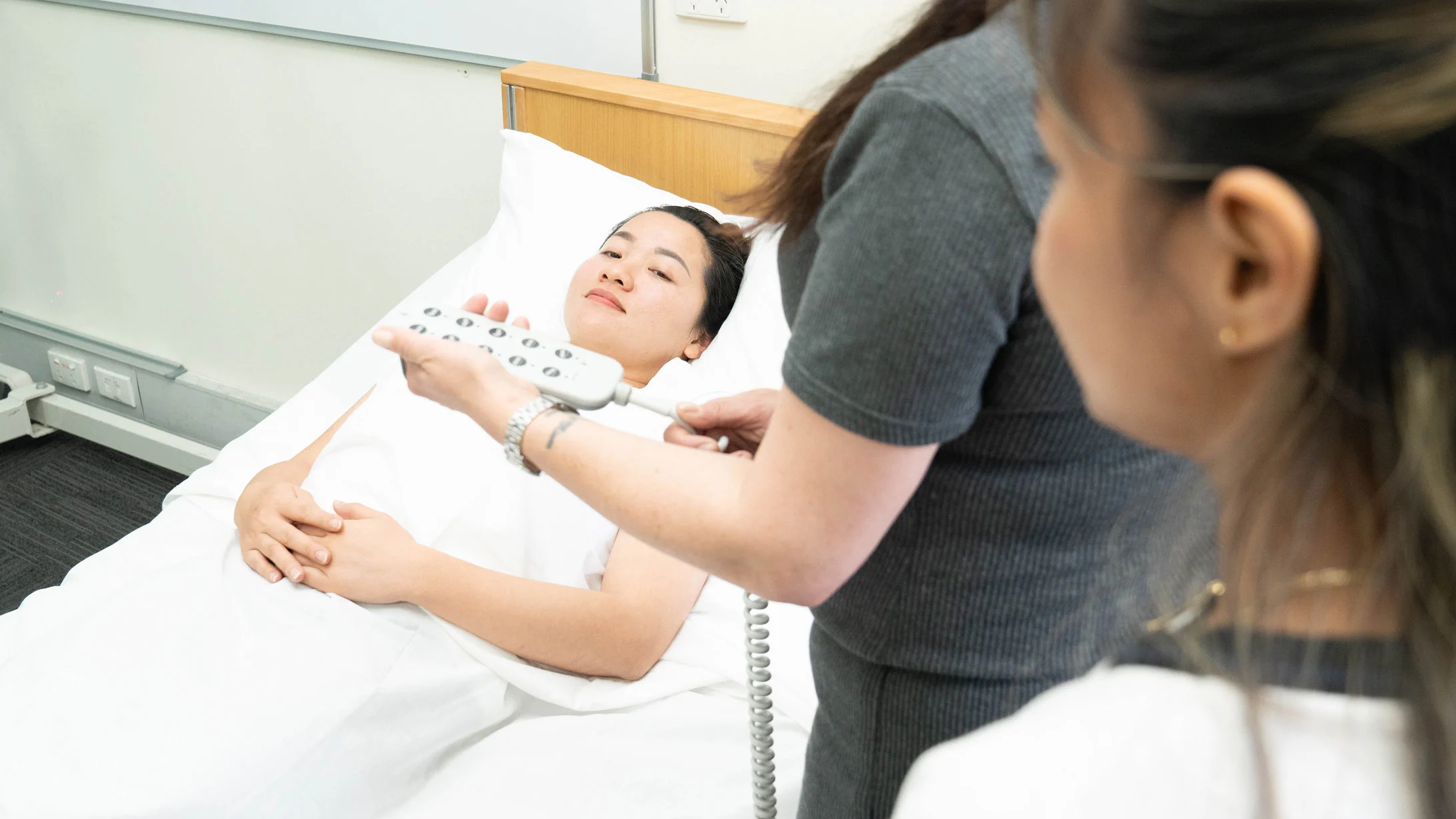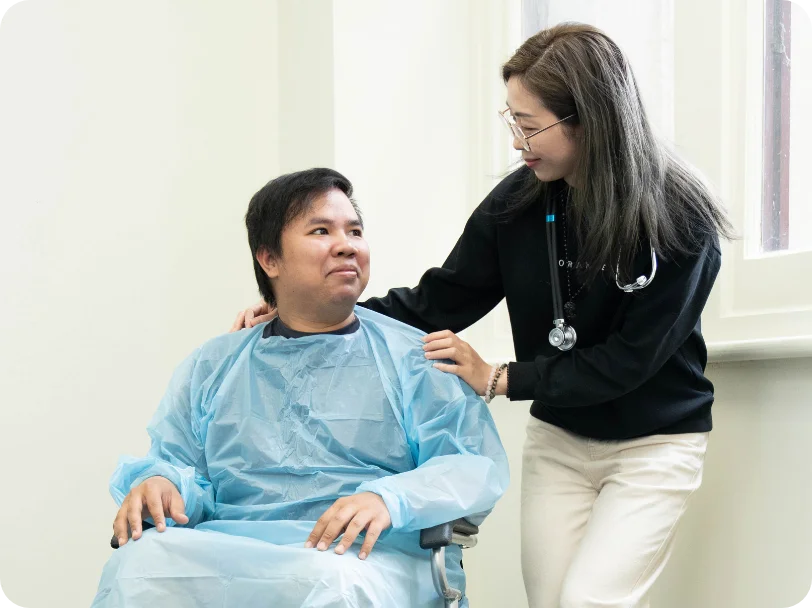


This qualification reflects the role of individuals in the community, home or residential care setting who work under supervision and delegation as a part of a multi-disciplinary team, following an individualised plan to provide person-centred support to people who may require support due to ageing, disability or some other reason.
These individuals take responsibility for their own outputs within the scope of their job role and delegation. Workers have a range of factual, technical and procedural knowledge, as well as some theoretical knowledge of the concepts and practices required to provide person-centred support.
The skills in this qualification must be applied in accordance with Commonwealth and State/Territory legislation, Australian standards and industry codes of practice.
To achieve this qualification, the candidate must have completed at least 120 hours of work placement as detailed in the Assessment Requirements of the units of competency. The latest release of the qualification and packaging rules can be found at the following link:
There are no specific entry requirements as per the qualification details or training package. International learners entering this course at Allied Institute must meet the following entry requirements:
Age requirements
Learners must be a minimum age of 18 years or above at the time of course commencement.
Academic Requirements
To enter this qualification, applicants should have successfully completed an Australian Year 10 (or an international secondary school year which is equivalent to Australian Year 10 with satisfactory results, OR successful completion of a recognised Foundation Studies program in Australia, OR successful completion of the international Baccalaureate Certificate, OR Successful completion of an Australian qualification of AQF level 3. An educational achievement, which is greater than any of these, is also suitable. e.g. successful completion of Australian Year 10.
English Language Requirements
Applicants must provide evidence of completion of the International English Language Testing system (IELTS Test), either Academic (A) or General (G) band 6 overall, or its equivalent completed within 2 years from the application date.
Or:
International students who can prove one of the following criteria are not required to demonstrate their English entry requirements as listed above:
DHA requirements for international students:
Applicants must also provide documentation according to Department of Home Affair requirements. For further information on student visa assessment level and documentation, visit Department of Home Affairs’ website at: https://www.homeaffairs.gov.au/
Pre-training review
All international learners will undertake pre-training review to determine suitability for the course and student needs. The aim of the review is to identify their training needs through questions on previous education or training, relevance of the course to applicant, and relevant experience. The Pre-training review will also aim to identify any support needs and possible RPL opportunities.
Through pre-training review learner will demonstrate that they have necessary skills to successfully complete the course.
Allied Institute will identify any such barriers presented by learners during pre-training review and provide required support and reasonable adjustment where possible.
Language, Literacy and Numeracy (LLN) Assessment
Learners might be required to complete an LLN assessment prior to the commencement of the course. – it is a diagnostic process to identify if prospective student requires LLN support during study.
Hardware/Software requirements
Allied Institute will provide access to computers/laptops during classroom hours, however for learners to work on assessments, tasks and self-study all learners are expected to have access to a laptop or computer with Windows operating system and Office applications like Microsoft Word.
Note: Some assessment tasks are completed using a computer and internet, and it is essential for the student to possess basic computer skills.
Physical requirements
Applicants will need to have physical attributes suitable for working in the health industry.
Note: A National Police check will be completed prior to attending practical placement. Proof of immunisation against mandatory conditions is required including Influenza and Covid.
Placement requirements
Influenza vaccinations are required annually by 15 August for certain healthcare workers. (Mandatory for placement)
COVID-19 vaccinations are also required for certain healthcare workers. (Subject to the facility entry requirements)
Allied Institute students are to follow all necessary requirements based on the current Victorian Department of Health Advice Vaccination for healthcare workers | health.vic.gov.au prior to placement.
2nd June
07th July
11th August
06th October
10th November
For further enquiries please enquire with our marketing team.
Learners may be able to reduce the number of units to be studied in their chosen course by measuring skills acquired through work, life experiences or qualifications obtained from formal studies or training ( RPL- Recognition of Prior Learning, or Credit Transfer). The granting of course credit may affect course fees as well as the duration of the course.
This process is outlined in Allied Institute Student Enrolment & Induction Policy and Assessment Policy.
If students have previously completed a unit with the same unit code or unit title as in the student’s new course, students may be eligible for a Credit Transfer and students may not have to repeat that unit. Students will need to complete a credit transfer application form and provide a certified copy of the transcript of the statement of attainment. There is a fee for this process. Applications for credit transfer must be made prior to the commencement of the course.
Students may apply for Recognition of Prior Learning (RPL) if they can demonstrate that their work and life experiences match one or more of the units in which they have enrolled. They must be able to demonstrate that they have achieved the skills and knowledge equivalent to the learning outcomes of the unit/s. Evidence that demonstrates this achievement may be through a portfolio of evidence. Applications for RPL must be made prior to the commencement of the course – please speak with the Student Support Officer if you wish to apply. There is a fee for consideration of RPL applications.
Students who complete this course may wish to continue their education into:

Employment may include, but not limited to:
Senior Personal Care Assistant, Care assistant, Accommodation Support Worker, Residential Support Worker, Community Access Coordinator, Community care worker, Community House Worker, Residential Care Worker, Food Services Deliverer, Transport Support Worker, In-Home Respite Worker, Disability Service Officer, Care Worker, Client Assistant, School Support Officer (Disability), Family Support Worker, Care Service Employee, Planned activity assistant, Residential aide, Field Officer (Community Services), Nurse’s Aide, Home care assistant.